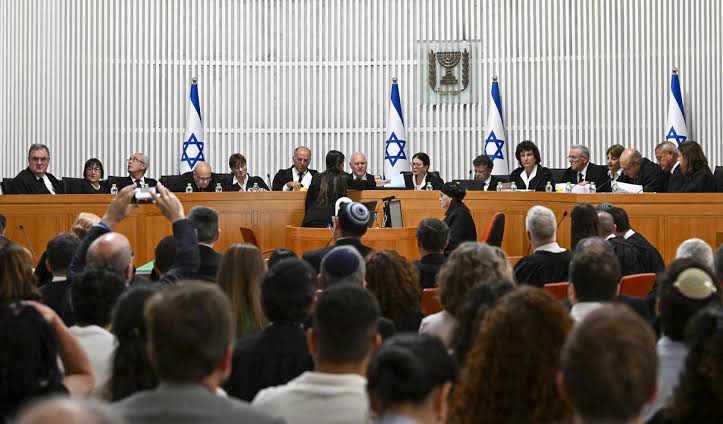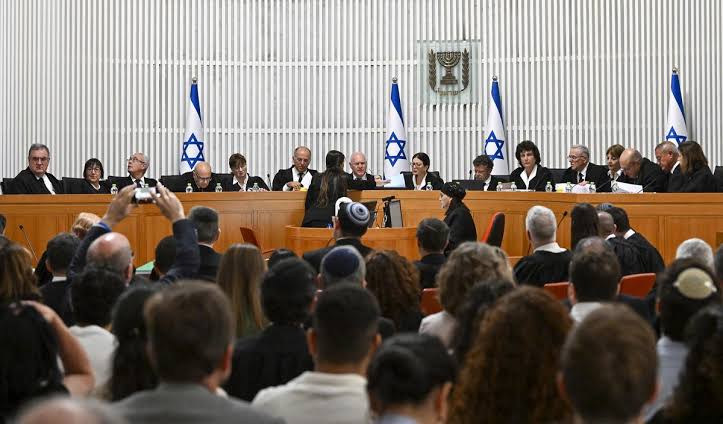In a historic legal battle that has captivated the nation, Israel’s Supreme Court finds itself at the epicenter of a constitutional clash. This article delves into the first-ever challenge to former Prime Minister Benjamin Netanyahu’s controversial judicial overhaul, a case that is testing the very foundations of Israeli democracy.
Table of Contents
The Unprecedented Gathering
For the first time in Israel’s history, all 15 Supreme Court justices have assembled to hear appeals related to this case. This is a departure from the regular panel of three justices, underscoring the profound significance of the matter. Adding to the sense of transparency, the proceedings are being livestreamed, allowing citizens to witness the legal showdown firsthand.
Understanding the Overhaul Law
At the heart of this legal challenge is a law passed by parliament in July. This law effectively removes the court’s authority to invalidate government decisions that it deems “unreasonable.” It is a pivotal element of Netanyahu’s broader plan to curtail the Supreme Court’s influence while empowering the governing coalition.
Deepening Divisions Among the Public
The judicial overhaul has deeply divided the nation along political and ideological lines. Netanyahu’s supporters, primarily from rural areas and settlements, tend to be poorer, more religious, and often of Mizrahi Jewish heritage. In contrast, protesters, largely from the secular middle class, have vigorously opposed the reforms.
Mass Protests: A Nation’s Outcry
Tens of thousands of Israelis have taken to the streets, waving national flags and chanting slogans against the government. The protests have transcended traditional boundaries, with high-tech business leaders even threatening to relocate their companies. Perhaps most strikingly, thousands of military reservists have broken ranks with the government, declaring their refusal to report for duty in protest.

Constitutional Clash: Dueling Visions of Democracy
At its core, this case embodies a broader struggle within Israel over fundamentally different interpretations of democracy. Netanyahu and his coalition contend that as elected representatives, they possess a democratic mandate to govern without undue interference from the court, which they portray as a bastion of the secular, left-leaning elite.
In contrast, opponents argue that the court serves as the primary check on majority rule in a country with a system of checks and balances that is limited in scope—just one house of parliament, a figurehead president, and no firm, written constitution. They stress that without the power to review and overturn some government decisions, Netanyahu’s government could appoint convicted individuals to Cabinet posts, roll back rights for women and minorities, and potentially annex the occupied West Bank—actions that the court, with its current powers, would likely strike down.
The Risks to Democracy
Legal experts issue a stark warning, cautioning against undermining the court’s role. They emphasize that democracies don’t crumble in a day but erode slowly, step by step, law by law. In this context, the gradual erosion of the court’s authority poses a profound risk to Israeli democracy.
The political fate of Benjamin Netanyahu, who returned to power late last year while on trial for corruption, hinges on his hard-line, religiously conservative coalition partners. These partners have threatened to rebel if Netanyahu relents on the legislation. Netanyahu himself has been ambiguous about whether he would respect a court decision to strike down the new law, further muddying the waters. Some members of his coalition, including Justice Minister Yariv Levin, have hinted that the government could simply ignore the court’s decision.
The Specter of a Constitutional Crisis
Legal experts warn that such disregard for the court’s decision could spark a constitutional crisis, leaving citizens and the country’s security forces in an unprecedented situation where they must decide whose orders to follow—the parliament’s or the court’s. This potential showdown would push the nation into uncharted territory, with profound consequences for its democracy and rule of law.

In conclusion, the Israeli Supreme Court’s handling of this case marks a pivotal moment in the nation’s history. The clash between the executive and judicial branches raises questions about the very essence of democracy and the rule of law. As the court deliberates, Israel and the world await its decision with great anticipation. This landmark case will undoubtedly shape the future of Israeli democracy and set a precedent for the delicate balance of power between the branches of government.













